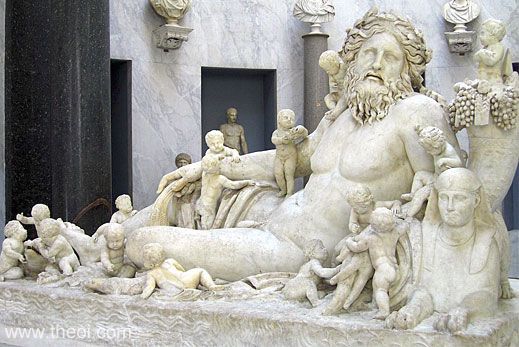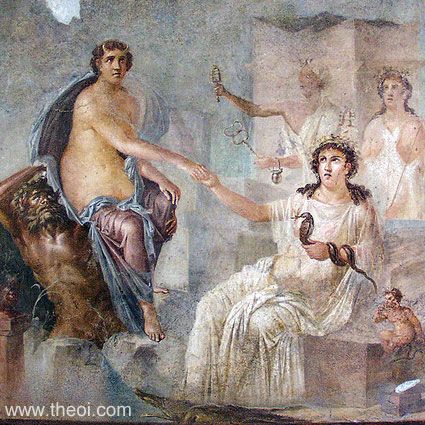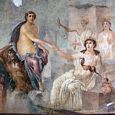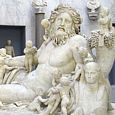NEILOS
Greek Name
Νειλος
Transliteration
Neilos
Latin Spelling
Nilus
Translation
River Nile

NEILOS (Nile) was the River-God of Aigyptos (Egypt) in North Africa.
Neilos was the Greek name for the River Nile. The only other north African river known to have been personified by the Greeks was the Khrementes (Chremetes) of western Libya.
FAMILY OF THE NILE
PARENTS
[1] OKEANOS & TETHYS (Hesiod Theogony 337, Hyginus Preface)
OFFSPRING
[1] MEMPHIS, ANKHINOE (Apollodorus 2.10, 2.11)
[2] ANIPPE (Plutarch Greek & Roman Parallel Stories 38)
[3] KHIONE (by Kallirhoe) (Servius on Virgil's Aeneid 4.250)
[4] Perhaps KALIADNE, POLYXO
ENCYCLOPEDIA
NILUS (Neilos), the god of the river Nile in Egypt, is said to have been a son of Oceanus and Thetys, and father of Memphis and Chione. (Hes. Theog. 338; Apollod. ii. 1. § 4; Serv. ad Aen. iv. 250.) Pindar (Pyth. iv. 90) calls him a son of Cronos.
Source: Dictionary of Greek and Roman Biography and Mythology.
CLASSICAL LITERATURE QUOTES
PARENTAGE OF RIVER-GOD NILE

Hesiod, Theogony 337 ff (trans. Evelyn-White) (Greek epic C8th or 7th B.C.) :
"Tethys bore to Okeanos (Oceanus) the swirling Potamoi (Rivers), Neilos (Nile), Alpheios (Alpheus), and deep-eddying Eridanos [in a long list of rivers]."
Pseudo-Hyginus, Preface (trans. Grant) (Roman mythographer C2nd A.D.) :
"From Oceanus and Tethys [were born] the Oceanides . . . Of the same descent Rivers : Strymon, Nile, Euphrates, Tanais, Indus, Cephisus, Ismenus, Axenus, Achelous, Simoeis, Inachus, Alpheus, Thermodon, Scamandrus, Tigris, Maeandrus, Orontes."
CHILDREN OF RIVER-GOD NILE
Pseudo-Apollodorus, Bibliotheca 2. 10 (trans. Aldrich) (Greek mythographer C2nd A.D.) :
"When Epaphos was ruler of the Aigyptians (Egyptians), he married Neilos' (Nile's) daughter Memphis, and in her honour founded the polis of Memphis, and fathered a daughter Libya." [N.B. Libya was the ancient Greek name for the continent of Africa.]
Pseudo-Apollodorus, Bibliotheca 2. 11 :
"Belos (Belus) [grandson of Epaphos] remained to become king of Aigyptos (Egypt), and married Neilos' (Nile's) daughter Ankhinoe (Anchinoe), who gave him twin sons, Aigyptos (Aegyptus) and Danaus."
Pseudo-Plutarch, Greek and Roman Parallel Stories 38 (trans. Babbitt) (Greek historian C2nd A.D.) :
"Bousiris (Busiris), the son of Poseidon and Anippe, daughter of Neilos (Nile) . . . So says Agathon of Samos."
Ovid, Metamorphoses 5. 187 ff (trans. Melville) (Roman epic C1st B.C. to C1st A.D.) :
"[In the court of Kepheus (Cepheus), king of Aithiopia (Ethiopia), was a man named: ] Nileus who falsely claimed descent from sevenfold Nilus (Nile) and bore a shield embossed in gold and silver with those seven streams."
NEILOS GOD OF THE RIVER NILE
Aeschylus, Fragment 161 (from Anonymous, On the Swelling of the Nile) (trans. Weir Smyth) (Greek tragedy C5th B.C.) :
"Knowing full well, I can laud the race of the Aithiopian (Ethiopian) land, where seven-channelled Neilos (the Nile) rolleth his refreshing tide, fed by abundant, wind-born rain, and therein the fire-eyed sun beaming forth upon the earth, melteth the snow amid the rocks; and all luxuriant Aigyptos (Egypt), filled with the sacred flood, maketh to spring up Demeter's life-giving grain."
Herodotus, Histories 2. 21. 1 (trans. Godley) (Greek historian C5th B.C.) :
"[On the source of the River Nile :] The second opinion is less grounded on knowledge than the previous, though it is more marvellous to the ear : according to it, the river [i.e. the Nile] effects what it does because it flows from Okeanos (Oceanus), which flows around the whole world."
Pausanias, Description of Greece 8. 24. 11 (trans. Jones) (Greek travelogue C2nd A.D.) :
"Except for the Aigyptian Neilos (Egyptian Nile) the rivers all have white stone statues, but people believe you should make statues of the Neilos in dark stone, because he flows down to the sea through Aithiopia (Ethiopia)."
Philostratus the Elder, Imagines 1. 5 (trans. Fairbanks) (Greek rhetorician C3rd A.D.) :
"[Ostensibly a description of an ancient Greek painting at Neapolis (Naples) :] About Neilos (the Nile) the Pekheis (Dwarfs) are sporting, children no taller than their name implies [i.e. pêkheis means 'cubit-tall']; and Neilos (Nile) delights in them for many reason, but particularly because they herald his coming in great floods for the Egyptians. At any rate they draw near and come to him seemingly out of the water, infants dainty and smiling, and I think they are not without the gift of speech also. Some sit on his shoulders, some cling to his curling locks, some are asleep on his arms, and some romp on his breast. And he yields them flowers, some form his lap and some from his arms, that they may weave them into crowns and, sacred and fragrant themselves, may have a bed of flowers to sleep upon. And the children climb up one on another with sistra in their hands, instruments the sound of which is familiar to that river. Crocodiles, however, and hippopotami, which some artists associate with Neilos (the Nile) in their paintings, are now lying aloof in its deep eddies so as not to frighten the children. But that the River is Neilos (the Nile) is indicated, my boy, by symbols of agriculture and navigation, and for the following reason : At its flood Neilos (the Nile) makes Egypt open to boats; then, when it has been drunk up by the fields, it gives the people a fertile land to till; and in Aithiopia, where it takes its rise, a divinity is set over it as its steward, and he it is who sends forth its water at the right seasons. This divinity has been painted so as to seem heaven-high, and he plants his foot on the sources, his head bent forward like Poseidon. Toward him the River is looking, and it prays that its infants may be many."
[N.B. The infants are the Karpoi (Carpi), godlings of the fruits of the earth.]
Philostratus the Elder, Imagines 1. 7 :
"Memnon [of Aithiopia (Ethiopia)], the son of Eos . . . Notice how long is the crop of curls, which he grew, no doubt, that he might dedicate them to Neilos (the Nile); for while the mouth of Neilos (the Nile) belongs to Aigyptos (Egypt), the sources of it belong to Aithiopia."
Anonymous, Epigram (trans. Page, Vol. Select Papyri III, No. 113) (Greek elegiac C1st B.C.) :
"Caesar calmed the storm of war [i.e. in the battle against Antony and Cleopatra at Actium] . . . and came rejoicing to the land of Neilos (the Nile), heavy-laden with the cargo of law and order, and prosperity's abundant riches, like Zeus Eleutherios (God of Freedom); and Neilos welcomed his lord with arms of bounty, and his wife [i.e. Egypt], whom with golden arms the river laves, received the shower, apart from stress or strife, that came from her Zeus Eleutherios."
Ovid, Metamorphoses 2. 254 ff (trans. Melville) (Roman epic C1st B.C. to C1st A.D.) :
"[When Phaethon, driving the chariot of the sun, set the earth ablaze :] Nilus (the Nile) in terror to the world's end fled and his head, still hidden; this seven mouths gaped dusty, seven vales without a stream."
Ovid, Heroides 14. 107 ff (trans. Showerman) (Roman poetry C1st B.C. to C1st A.D.) :
"Nilus (Nile), let flow to the sea through seven mouths, strips from the maddened heifer [Io] the features loved of Jove [Zeus]."
[N.B. Io was transformed into a heifer by Zeus to hide her from the wrath of Hera. But she was driven mad by a gadfly sent to torment her by the goddess and wandered to Egypt where her form was finally restored.]
Valerius Flaccus, Argonautica 4. 345 ff (trans. Mozley) (Roman epic C1st A.D.) :
"[River] Nile withstands Tisiphone [i.e. the Erinys tormening Io] and driving her with all his eddying flood plunges her to the depths of his sandy bed, calling for help to Dis [Haides] and all the powers of that cruel realm; here and there are seen her brands and whips far scattered, and the serpents shaken from her dishevelled hair."
Statius, Thebaid 4. 706 ff (trans. Mozley) (Roman epic C1st A.D.) :
"When ebbing Nilus (Nile) buries itself in mighty caverns and gathers into its mouth the life-giving streams of Eastern winters, the flood-deserted valleys steam, Aegyptos (Egypt) gapes wide and waits the expectant roar of her sire's waves, till by dint of many prayers he give sustenance to the Pharian fields and bring on a great year of harvest."
Statius, Thebaid 8. 359 ff :
"When Nilus (the Nile) in his secret region has drunk with mighty mouth the nurture of a distant sky and the cold snows of the East, he breaks up all his wealth of waters and carries his tempests to the sea in seven wide channels o'er the fields; the routed Nereides take refuge in the depths, and fear to meet the saltless main."
CONSTELLATION RIVER
Pseudo-Hyginus, Astronomica 2. 32 (trans. Grant) (Roman mythographer C2nd A.D.) :
"River [Constellation Eridanus]. Some call this the Nile, though many call it Oceanus. Those who advocate the Nile point out that it is correctly so called on account of the great length and usefulness of that River, and especially because below the sign is a certain star, shining more brightly than the rest, called Canopus. Canopus is an island washed by the river Nile."
ANCIENT GREEK & ROMAN ART
SOURCES
GREEK
- Hesiod, Theogony - Greek Epic C8th - 7th B.C.
- Aeschylus, Fragments - Greek Tragedy C5th B.C.
- Apollodorus, The Library - Greek Mythography C2nd A.D.
- Pausanias, Description of Greece - Greek Travelogue C2nd A.D.
- Plutarch, Parallel Stories - Greek Historian C1st - 2nd A.D.
- Greek Papyri III Anonymous, Fragments - Greek Poetry C1st B.C
- Philostratus the Elder, Imagines - Greek Rhetoric C3rd A.D.
ROMAN
- Hyginus, Fabulae - Latin Mythography C2nd A.D.
- Ovid, Metamorphoses - Latin Epic C1st B.C. - C1st A.D.
- Ovid, Heroides - Latin Poetry C1st B.C. - C1st A.D.
- Valerius Flaccus, The Argonautica - Latin Epic C1st A.D.
- Statius, Thebaid - Latin Epic C1st A.D.
BIBLIOGRAPHY
A complete bibliography of the translations quoted on this page.

